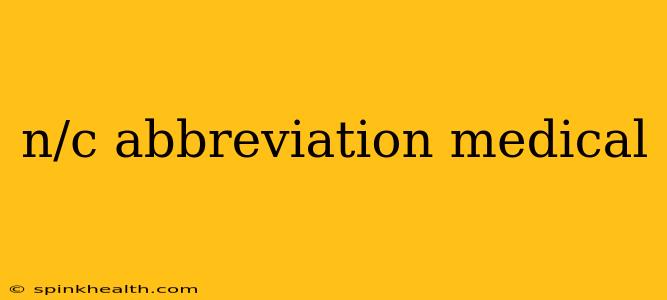The medical world is filled with abbreviations, a shorthand language born from the need for efficiency and speed. Sometimes, however, these abbreviations can be confusing, even for those within the medical field. One such abbreviation is "N/C," frequently encountered in medical records and notes. Let's unravel the meaning and context of this common abbreviation.
The most frequent interpretation of "N/C" in a medical setting is "No Complaint." Imagine a scenario: a patient undergoes a routine check-up. The doctor conducts a thorough examination, and finds no abnormalities. In the patient's chart, the physician might simply note "N/C" to indicate that the patient reported no health concerns or symptoms.
This seemingly simple abbreviation, however, can have implications beyond a simple lack of reported symptoms. Understanding its context is vital for accurate interpretation.
What does N/C mean in different medical contexts?
The meaning of "N/C" can vary slightly depending on the specific context within a medical record. While "No Complaint" is the most common meaning, it's crucial to consider the surrounding information to gain a complete understanding.
1. What does N/C mean in a patient's chart after a procedure?
After a surgical procedure or a diagnostic test, "N/C" might signify that the patient reported no immediate post-procedure complications or discomfort. This doesn’t necessarily mean there are no long-term effects; it simply reflects the patient’s immediate experience. For example, a patient might report "N/C" after a blood draw, indicating no pain or bruising at the puncture site immediately following the procedure.
2. What does N/C mean in a nursing note?
In nursing notes, "N/C" might be used to record that a patient didn't express any distress or discomfort during a particular period. For example, a nurse might document "N/C" after checking on a patient's vital signs, indicating the patient showed no signs of pain, anxiety, or other problems.
3. Can N/C mean something other than "No Complaint"?
While "No Complaint" is the dominant interpretation, it's important to acknowledge the possibility of other, less common meanings. In rare cases, "N/C" might be used as an abbreviation for other terms. However, without additional context, "No Complaint" remains the most probable interpretation. Always refer to the complete medical record for clarification.
Why is understanding N/C crucial?
Understanding the nuances of medical abbreviations like "N/C" is critical for several reasons:
- Accurate medical record-keeping: Correctly interpreting "N/C" ensures the patient's medical history is documented accurately.
- Effective communication: Medical professionals rely on concise and precise communication. Understanding abbreviations is essential for seamless collaboration and efficient patient care.
- Patient safety: Misinterpreting medical abbreviations can lead to errors in diagnosis and treatment, potentially compromising patient safety.
In conclusion, while "N/C" most commonly stands for "No Complaint" in the medical field, the specific context is crucial for precise interpretation. Always consider the surrounding information within the medical record to fully understand the meaning and implications of this abbreviation. If there's any ambiguity, seeking clarification from the healthcare professional who documented the note is always the best approach.

